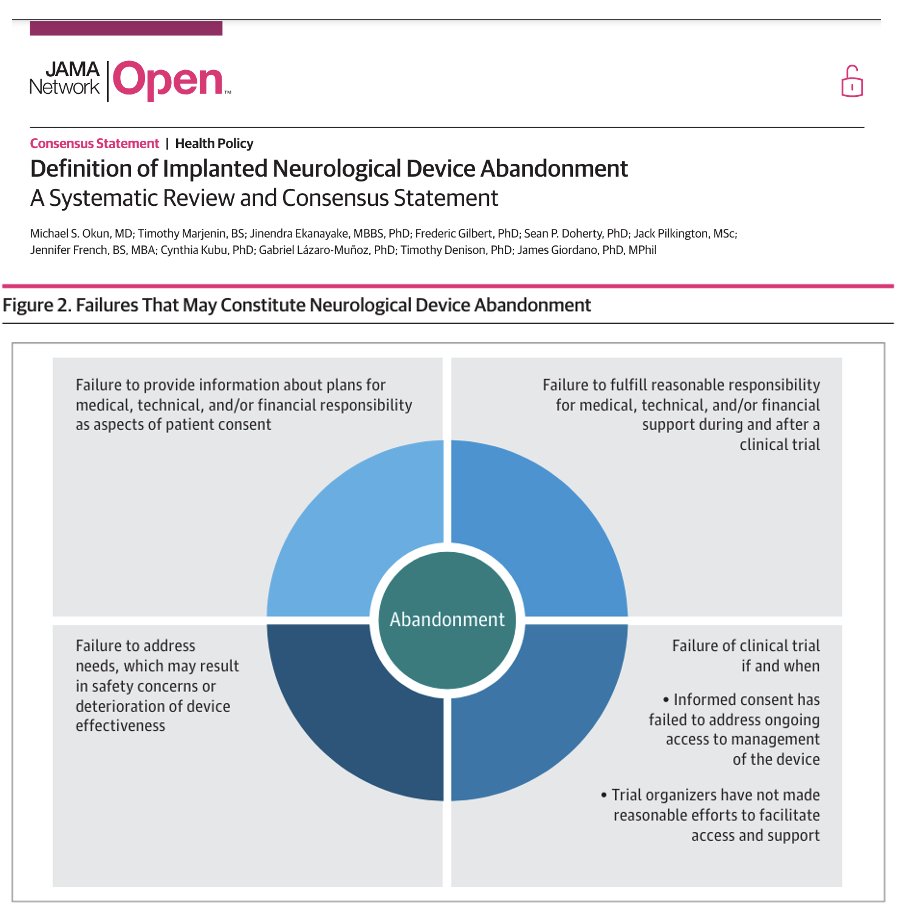
Gabriel Lazaro-Munoz
@GLMbioethics
Followers
1K
Following
2K
Statuses
1K
Assistant Professor @HarvardMed @MGHNeurosurg & @MGHPsychiatry Bioethicist, Neuroscientist, Lawyer. Ethical and social implications of genomics & neuroscience
Boston, MA
Joined September 2017
Just published in @JAMANetworkOpen: "Public Attitudes, Interests, and Concerns Regarding Polygenic Embryo Screening" Collaborators: Dorit Barlevy, @_StaceyPereira @ShaiCarmi @ToddLencz @GLMbioethics
0
1
3
RT @BobCarterMD: It takes a coalition to build visionary new programs. It was fantastic this past year to work with Dr. Marcela del Carmen,…
0
6
0
RT @BobCarterMD: Highlights of 2024: One of the exciting initiatives for me as chair of @MGBneurosurgery this past year, was witnessing the…
0
8
0
RT @neuroXcareer: NJAM Senior Fellows will receive mentorship and training from NJAM Director Dr. Theresa Williamson MD MPH @Twilli7, as we…
0
2
0
RT @neuroXcareer: 📢Job Alert: Join the Neurotech Justice Accelerator at Mass General Brigham (NJAM), a @dana_fdn Center for Neuroscience an…
0
5
0
RT @mkellyhedrick: excited to share our paper on bioethics & nsgy in @WorldNeurosurg the idea of this paper was born 2 yrs ago, great to se…
0
15
0
RT @HMSbioethics: Congratulations to Ana Lucía Battaglino, MA and Erika Versalovic, PhD, researchers in our @GLMbioethics Brain Bioethics…
0
1
0
What happens if you have a device implanted in your brain and the company goes out of business? What happens if the device was in trial and is not FDA approved? What happens when a company cannot support the product? Out today in @JAMANetworkOpen new consensus on device abandonment inspired by @royalsociety meeting in Sept. 2023. Key Points: - This paper provides a definition of implanted neurological device abandonment. - It also provides a systematic review and consensus statement. - 734 articles published only 7 were relevant to neurological device abandonment. - A multistakeholder group developed a consensus definition for neurological device abandonment. - The definition included 'devices used in deep brain stimulation, vagal nerve stimulation, and spinal cord stimulation, including failures related to patient consent, support before the end of the device's lifespan, and safety concerns.' My take: We need to be proactive as the neurological device community inevitably grows, abandonment will become more and more common. There is thus, a huge looming problem emerging in the field of brain and spinal cord implants and there will be device abandonment. Establishing a formal definition of neurological device abandonment will be critical for development of guidelines, policies, and laws to reduce or prevent such abandonment. The definition for neurological device abandonment should 'entail failure to provide fundamental aspects of patient consent; fulfill reasonable responsibility for medical, technical, or financial support prior to the end of the device’s labeled lifetime; and address any or all immediate needs that may result in safety concerns or device ineffectiveness and that the definition of abandonment associated with the failure of a research trial should be contingent on specific circumstances.' We need to have the dialogue on abandonment today and not 'kick the can down the road,' which could trigger critical safety and access concerns. #deepbrainstimulation #neuromodulation #DBS #Parkinsons
0
1
2
RT @armerner_psych: Excited to see the DBS Think Tank proceedings out, including the @GLMbioethics lab's continued work on post-trial oblig…
0
4
0
RT @neuroethics2day: Meet junior neuroethicist Amanda Merner in this short series of a Day in the Life of a Neuroethicist
0
4
0
RT @ericgarcialopez: We are delighted to present this original research in our special issue on NeuroRights. Ethical Considerations for In…
0
3
0
RT @ELSIhub: We are pleased to announce the publication of a new addition to ELSIhub Collections: Screening Embryos for Psychiatric Conditi…
0
2
0
RT @PetrieFlom: Read comment from @CohenProf in "Genetic testing of embryos: An ethical debate unfolds" via @Boston…
0
3
0
RT @MGHMartinos: .@SusieHuangMDPhD & colleagues are working to increase diversity in the recruitment and enrollment of human participants i…
0
5
0
RT @theamygdaloid: Today is the launch of my new book. It was fun to do. As always, you learn a lot by writing. Thanks Harvard University P…
0
62
0
RT @armerner_psych: New commentary from me & @CynthiaKubuPhD about the impacts of speculative neuroethics research including: increasing st…
0
4
0
RT @ToddLencz: ANOTHER NEW PREPRINT! In a nationally representative survey (n=1435), we find high approval for polygenic embryo screening.…
0
16
0
ANOTHER NEW PREPRINT! In a nationally representative survey (n=1435), we find high approval for polygenic embryo screening. In a separate sample, presenting concerns first increased ambivalence but not disapproval. Work led by @RemyFurrer & @GLMbioethics
0
0
1
The second manuscript was led by @RemyFurrer, mentored by Gabriel Lazaro-Munoz @GLMbioethics. Remy conducted a survey of the US public (n=1435) to examine attitudes towards PES. The survey design was based on the qualitative interviews.
0
0
1






